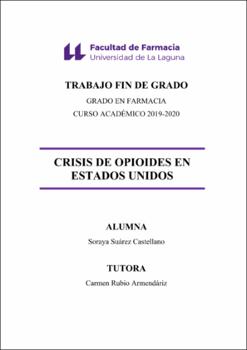Crisis de opioides en Estados Unidos
Fecha
2020Resumen
La crisis de opioides en EEUU ha supuesto un antes y un después para el país. El consumo abusivo de los analgésicos opiáceos prescritos derivó en la generación de pacientes adictos a estos fármacos, que buscaban combatir el síndrome de abstinencia con otros
fármacos e incluso con opioides ilegales, lo que se asoció a un incremento del número de
fallecido por sobredosis a opiáceos. El desconocimiento o la falta de transparencia en la
comunicación sobre la tolerancia, dependencia y síndrome de abstinencia que estos analgésicos opiáceos podían generar en el consumidor crónico ha sido identificada como una de las principales causas de esta crisis.
En esta revisión bibliográfica se estudia el papel que tuvieron las industrias farmacéuticas comercializadoras de los analgésicos opiáceos involucrados en esta crisis. ¿Antepusieron las farmacéuticas el beneficio económico frente a la salud del paciente? ¿Ocultaron información sobre el potencial adictivo de los analgésicos opiáceos?
Industrias farmacéuticas, médicos prescriptores, pacientes usuarios, farmacéuticos dispensadores y normativa vigente son pilares esenciales en el análisis y la gestión de esta crisis, pero también en el diseño de políticas y estrategias de prevención de situaciones similares en el futuro. El farmacéutico juega un papel central en el control y seguimiento del uso y consumo de este grupo de medicamentos en España. El uso racional y seguro de estos
fármacos se beneficia del conocimiento sobre ellos y por esto, el farmacéutico está comprometido con la educación sanitaria en cualquiera de sus intervenciones asistenciales. The opioid overdose crisis in USA has been a before and after for the country. The abusive consumption of prescription opioid analgesics derived in the generation of patients addicted to these drugs that seeks to combat abstinence syndrome with other drugs and even with ilegal opioids, which was associated with an increase in the number of deaths from opioid overdoses. Ignorance or lack of transparency in communication about tolerance,
dependency and abstinence syndrome that these chronic consumer-generated opioid pain relivers have been identified as one of the main causes of this crisis.
In this bibliographic review, the role of the pharmaceutical marketin companies of the opiate analgesics involved in this crisis is studied. Did the pharmaceutical companies putt he economic benefit ahead of the patient’s health? Did the hide information about the addictive potential of opiod pain relievers? Pharmaceutical industries, prescribing doctors, patient users, dispensing pharmacists
and current policies are fundamental pillars in the analysis and managemente of this crisis, but also in the design of policies and strategies to prevent similar situations in the future. The pharmacist plays a central role in the control and monitoring of the use and consumption of this group of drugs in Spain. The rational and safe use of these drugs benefits from knowledge about them and for this reason, the pharmacist is committed to health education in any of his health care.





